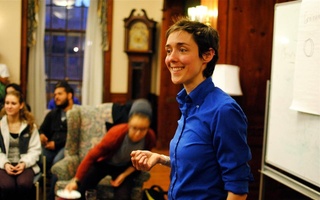PROFESSIONAL PREPARATION
Many students who end up taking advantage of the writing workshops Harvard has to offer also spend their extracurricular time perfecting their writing skills. Robinson’s interest in writing translates outside the classroom as well; last semester she was co-president of Tuesday Magazine, Harvard’s general interest student publication. In that position, she edited her peers’ work, publicized for submissions, and scraped together money to be able to print their publication. Robinson says that sometimes Tuesday was more stressful—and took up more of her time—than some of her academic courses.
Looking forward to her plans after graduating, Robinson thinks that the experience she gained in working for Tuesday has prepared her for a career as writer or editor at a magazine.
Liza M. Batkin ’15, who writes and edits for the Advocate, decided not to pursue creative writing as a part of her concentration. Instead, she says that she feels more at home with the type of critical writing she found in the Literature Department. “I found that writing an essay itself could be a creative act,” Batkin says.
Being a part of a literary magazine has provided her with an additional group of critical thinkers, and she spent her summer working for N+1, a literary journal based in New York that was founded in part by Advocate alumni.
“Sometimes it feels like creative production and academic pursuit are not in tune with each other,” Batkin says about academic life at Harvard. But, she says, with outlets outside of class, one can stay engaged in literary critique without going straight into academia after graduation.
Zoe K. Hitzig ’15—a Crimson Arts writer who is also the publisher of the Advocate—also values the skills she is learning as a student publisher of a major literary magazine. Though it is at times hard to balance studying for a test and making sure that a publication comes out on time, she’s not sorry that she chose to take on a leadership position. “A lot of members on the Exec board [of the Advocate] approach their positions as semi-professional,” Hitzig says. “There’s definitely a sense of responsibility...that puts the Advocate above academics in some sense.”
WORKSHOPS AS COLLABORATION
In addition to the pre-professional experience of working for the Advocate, Hitzig spoke highly of the community she has found there and mentioned that student editors often circulate their own writing, hoping for feedback and an intellectual conversation about the craft.
The Advocate has even started running student-led workshops for writers, whether they are members of the publication or not. Over Wintersession, Hitzig says, many students showed up to participate in workshops designed to reflect the varied academic pursuits of Advocate members.
Unlike Harvard’s writing workshops, the Advocate had poets edit with fiction writers, a unique dynamic that Hitzig says helps to integrate different literary forms in a way that was very valuable for those who attended. The workshops were so successful that the students hosted another round over the summer, and they were able to reach out to the community of Harvard researchers in the math and science departments who were on campus for the summer, people who Hitzig says wouldn’t otherwise be encouraged to write in their free time.
“People learn so much through their peers here, whether you’re formally part of an institution or not,” Hitzig says, pointing out that even if students are not part of a publication, it is still possible for them to be inspired by the kind of work that fellow writers are interested in studying.
Satire V takes the collaborative essence of a writing workshop to the extreme. Opening a copy of the comedic publication, you won’t find any individual bylines. Instead, students writing for the group come up with topic ideas collectively, edit over an email list, and then publish the humor pieces anonymously online. Alicia V. Mergenthaler ’15, one of two editors-in-chief, likes that articles for Satire V undergo so much editing.
“This fully collaborative process is really great,” Mergenthaler says. “Usually the piece is edited before it gets to the editors.”
Mergenthaler has been writing and editing for Satire V for three years and studies economics. Gus A. Mayopoulos ’15, the current president of the publication, studies history. Both see their participation in “Satire V” as an opportunity to parody serious communications like a Harvard University Police Department alert email, a letter from the Dean, and the Crimson.
Read more in Arts
The Most Used (and Abused) Classical Music PiecesRecommended Articles
-
Students Discuss Sex Openly in 'Unsupervised' TalkStudents gathered to discuss issues about sex and relationships in a workshop titled “Unsupervised” on Tuesday night as part of the second annual Sex Week at Harvard.
-
 Flirting With Furniture
Flirting With Furniture -
 Tutor Helps Students Read the Signs
Tutor Helps Students Read the Signs -
Sex Workshop Discusses Consent and NegotiationIn a room in Sever Hall Monday night, cookies were passed around and tea was served—a low-key setting for the discussion of sex. For two hours, representatives from the Office of Sexual Assault Prevention and Response and Harvard College Munch—a kinky sex discussion group at the College—discussed the importance of consent and negotiation in relationships.
-
 Avia Tadmor
Avia Tadmor -
Shimabukuro Wows at Ukulele WorkshopShimabukuro is renowned for his work, having been declared a musical “hero” by Rolling Stone and having topped the Billboard World Charts for his 2011 album, “Peace, Love, Ukulele.”













